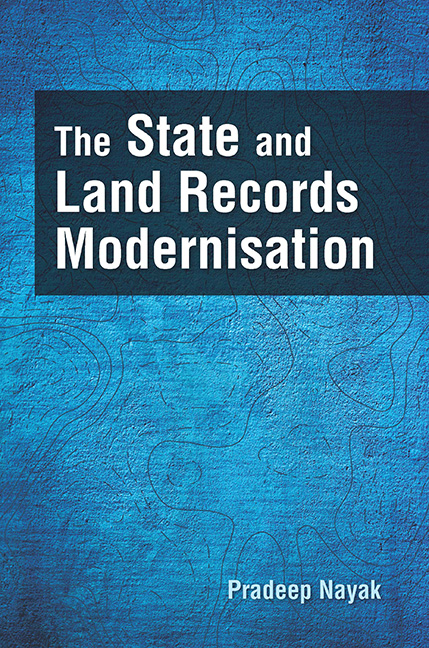Book contents
- Frontmatter
- Dedication
- Contents
- List of Figures and Tables
- Foreword
- Preface
- List of Abbreviations
- 1 The State, ICTs and Governance: A Theoretical Exploration
- 2 E-Governance in Public Policy Discourse in India
- 3 The State and the Policy of Land Records Management
- 4 The Computerisation of Land Records Programme in Odisha
- 5 The Computerisation of Land Records Programme in Karnataka
- 6 The Computerisation of Land Records Programmes in Karnataka and Odisha: A Comparative Study
- Conclusion: Beyond Techno-Managerial Governance
- Select Bibliography
- Index
Preface
Published online by Cambridge University Press: 02 December 2022
- Frontmatter
- Dedication
- Contents
- List of Figures and Tables
- Foreword
- Preface
- List of Abbreviations
- 1 The State, ICTs and Governance: A Theoretical Exploration
- 2 E-Governance in Public Policy Discourse in India
- 3 The State and the Policy of Land Records Management
- 4 The Computerisation of Land Records Programme in Odisha
- 5 The Computerisation of Land Records Programme in Karnataka
- 6 The Computerisation of Land Records Programmes in Karnataka and Odisha: A Comparative Study
- Conclusion: Beyond Techno-Managerial Governance
- Select Bibliography
- Index
Summary
In 1973, Herbert Simon, a much celebrated scholar in social sciences, observed that the major problem the governmental, corporate and educational organisations face is not the departmentalisation or coordination among the departments or operating units but that of organising information storage and information processing. He had opined that rapid development of information and communication technologies had made the public and corporate organisations more ‘sophisticated and rational’ than in the past.
The new technology as a ‘symptom of progress’ would be used as an ‘analytic tool’ for understanding human problems and helping their solution (H. Simon, 1973). Much before Herbert Simon's observation, Anthony Downs’ perceptive piece asks us to rethink the very rationale and purpose of applying information systems, given the uncertainty of technical payoff. The future of management of the information system, to him, depends upon the ways in which such data system increases the power and positions of the persons who apply such a system. ‘We must focus from the dazzling computer systems to the way in which the computers are applied by the men who use it’ (Downs, 1967). On the other hand, P. H. A. Frissen has also cautiously observed that the relationship between politics, administration and technology appears ambiguous notwithstanding the rationalising and modernising role of technology over the politico-administrative system (Frissen, 1999).
Therefore, given the scenario of difficulties and wider implications of the subject matter, pursuing a multidimensional and an interdisciplinary research on the role of state, ICTs and governance with reference to land records modernisation, at the Centre for the Study of Law and Governance, JNU, is somewhat a challenging task. The paucity of research materials and the demand for regular field visits have made it more difficult. By studying the computerisation of land records in India, one is required to straddle many aspects of the subject matter such as historical background of the land records management; role of the state and its policy shifts; impact of computerisation on the taluk/tahsil and its bureaucracy; the capacity of the government officials to handle cutting-edge ICTs and work in partnership with IT professionals and vendors; role of the political and administrative leadership; and role of ICTs in contributing governance reforms and its impact on democratic governance, citizenship, federalism and the development process.
- Type
- Chapter
- Information
- The State and Land Records Modernisation , pp. ix - xiPublisher: Foundation BooksPrint publication year: 2015



